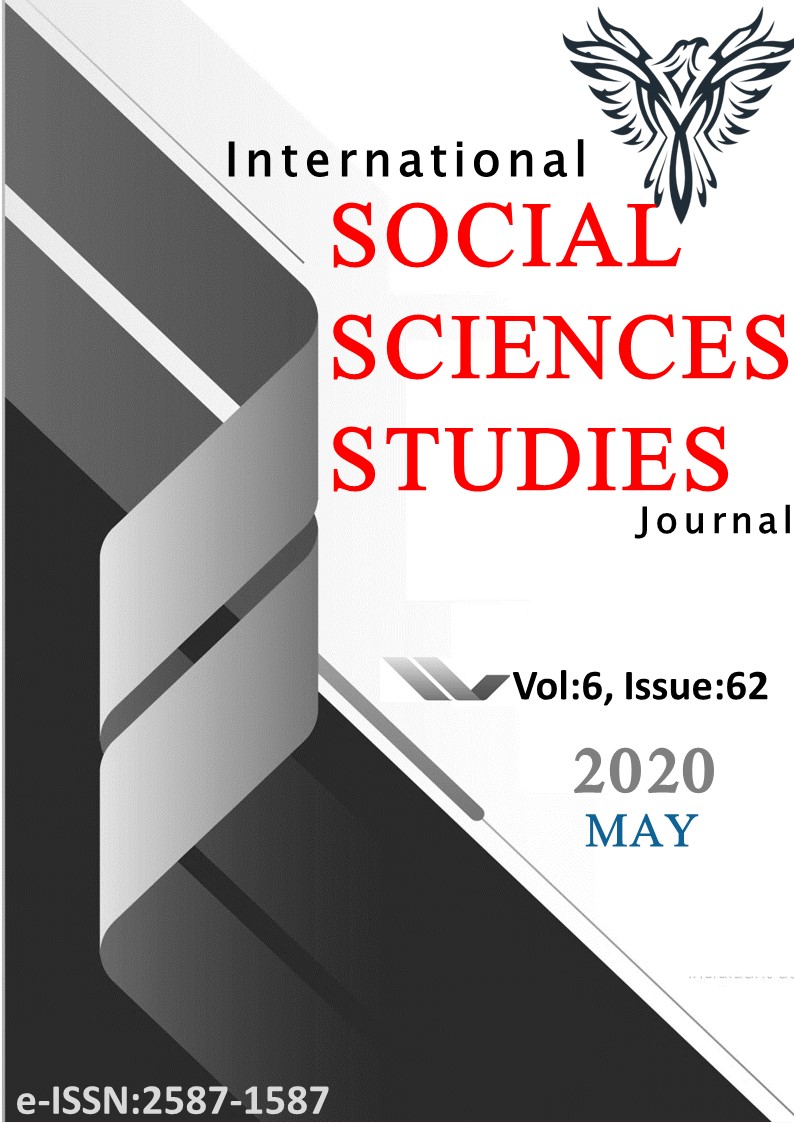Siyasal Katılımda Siyasi Partilerin Amblem, Logo, Bayrak Ve İsimlerinin Oy Verme Davranışı Üzerindeki Etkilerine Yönelik Seçmen Algıları: Karaman İli Seçmenleri
Author :
Abstract
Siyaset ve medya arasındaki ilişki tartışılan konulardandır. Siyaset ve medya arasında karşılıklı bir ilişki vardır. Bu ilişkide siyaset ve siyasilerin iktidar olma arzularını gerçekleştirmede hedef kitlelerinin desteğini ve bu hedef kitleleri içinde barındıran toplumu etkileyebilmek için siyasetin ve siyasilerin, medyanın etkileme gücüne ihtiyacı yadsınamaz bir gerçektir. Günümüzde siyaset ve medya ilişkisinin teknolojide meydana gelen gelişmeyle de farklı boyut kazanmıştır. Siyaset ve medya ilişkisinin bir başka ayağı da seçmenlerdir. Seçmenlerin bu ilişkiyi nasıl algıladığı ve ne derece önem verdiği çerçevesinde incelenecektir. Karaman il merkezinde gerçekleştirilen alan araştırması sonucunda elde edilen bilgi ve bulgular değerlendirmeye tabi tutulmaktadır. Betimsel araştırma yöntemi ve nicel araştırma yöntemlerinden birisi olan anket tekniğinden yararlanılan çalışmada elde edilen bulgular ve sonuçlardan ilki, katılımcıların siyasetle ilgili olduğudur. 61 yaş üstü yaş grubu seçmenlerin siyasetle daha ilgili oldukları görülmektedir. Kadın seçmenlerin siyaset-medya ilişkisinde medyanın, siyasilerle yüz yüze iletişimi azalttığı görüşündedirler. 46-60 yaş grubu seçmenler medyanın siyaseti yönlendirebileceği görüşündedirler. Düşük eğitimli seçmenler, medyanın siyasetin etkisini arttırdığını ve üniversite eğitimli seçmenler ise, siyasal bilgilenmelerinde medyanın etkili olduğu görüşündedirler.
Keywords
Abstract
The relationship between politics and the media is one of the debated topic. There is a mutual relationship between politics and the media. In this relationship, it is an undeniable fact that politics and politicians need the power of the media to influence the support of their target groups and the society that includes these target groups in realizing the desires of politics and politicians to be in power. Today, the relationship between politics and media has gained a different dimension with the development in technology. Another leg of the relationship between politics and media is voters. It will examined within the framework of how voters perceive this relationship and how much they attribute importance to it. The information and findings obtained as a result of the field research conducted in the city center of Karaman are evaluated. The first findings and results obtained from the study which uses the questionnaire technique, which is one of the descriptive research method and quantitative research methods, is that the participants are related to politics. It is seen that voters over the age of 61 are more interested in politics. Women voters are of the opinion that the media reduces the face-to-face communication with politicians in the relationship between politics - media. Voters of the 46-60 age group are of the opinion that the media can direct politics. Low-educated voters are of the opinion that the media increases the influence of politics, and university-educated voters are of the opinion that the media is effective in their political knowledge.
Keywords
- Dilber, F. (2020). “Siyasal Katılımda Siyasi Partilerin Amblem, Logo, Bayrak Ve İsimlerinin Oy Verme Davranışı Üzerindeki
- Vol:6, Issue: 62; pp:1973-1987 SİYASAL KATILIMDA SİYASİ PARTİLERİN AMBLEM, LOGO, BAYRAK VE İSİMLERİNİN OY VERME DAVRANIŞI ÜZERİNDEKİ ETKİLERİNE YÖNELİK SEÇMEN ALGILARI: KARAMAN İLİ SEÇMENLERİ Voter Perceptions About The Effects Of Emblems, Logos, Flags And Names Of Political Parties On Voting Behavior In Political Participation: Voters Of Karaman Province Dr. Öğr. Üyesi. Fadime DİLBER Karamanoğlu Mehmetbey Üniversitesi, Halkla İlişkiler Bölümü, Karaman/Türkiye ÖZET Günümüzde hızla değişen teknolojik gelişmeler siyasal iletişim uygulamalarında da değişikliği getirmiştir. Bu durum siyasi partilerin seçim kampanyalarında iletişim ve kampanya çeşitliliğinin artırmasına neden olmaktadır. Siyasal partiler tanınırlıklarını temelde siyasi kimliğini ve imajını oluşturan amblem, logo ve isimleriyle seçmenlere kendilerini tanıtmaktadır. Siyasi parti amblem, logo, bayrakları ve isimleri seçim kampanyalarında önemli yere sahip olan görsel iletişim unsurları, siyasal algılama kolaylığı sağlaması sayesinde, sözlü iletişime nazaran etkiyi artırmaktadır. Siyasi partiler, siyasal iletişimde, siyasal reklamcılık ve propaganda üzerinde daha çok ideolojik söylemler üzerine yoğunlaşmış, iletişimin görsel boyutu görece daha az önemsenmiştir. Bu çalışmada siyasal katılımda siyasi parti amblem, logo, bayrakları ve isimlerinin oy verme davranışı üzerindeki etkilerine yönelik seçmen algılarını ne yönde etkilediğini ortaya koymayı amaçlamaktadır. Son olarak, seçmenlerin siyasal katılımda siyasi parti amblem, logo, bayrakları ve isimlerinin oy verme davranışı üzerindeki etkilerine yönelik seçmen algıları Karaman il merkezinde gerçekleştirilen alan araştırması sonucunda elde edilen bilgi ve bulgular değerlendirmeye tabi tutulmaktadır. Betimsel araştırma yöntemi ve nicel araştırma yöntemlerinden birisi olan anket tekniğinden yararlanılan çalışmada elde edilen bulgular ve sonuçlardan ilki, katılımcıların siyasetle ilgili olduğudur. Katılımcılar siyasi partilerle ilgili haber ve kampanyaları büyük oranda takip etmektedir. Erkek katılımcılar ilk defa oy kullanacak olmaları durumunda siyasi parti amblemlerini ve ismini dikkate alacağını ifade etmekte, kadın katılımcılar ise siyasi kampanyalarda siyasi parti amblemlerinin kullanılmasının parti bağlılığını güçlendirdiğini görüşündedir. 31-45 yaş grubu seçmenlerin siyasi parti amblemlerinin parti tercihinde etkili olduğu yönündedir. Anahtar Kelimeler: Siyasi parti, Amblemler, Oy verme, Kurum kimliği





